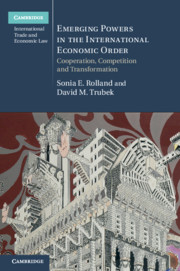89 results
Table of Cases
-
- Book:
- Emerging Powers in the International Economic Order
- Published online:
- 22 July 2019
- Print publication:
- 01 August 2019, pp xxiii-xxvii
-
- Chapter
- Export citation
Government Sources
-
- Book:
- Emerging Powers in the International Economic Order
- Published online:
- 22 July 2019
- Print publication:
- 01 August 2019, pp 223-229
-
- Chapter
- Export citation
5 - Emerging Economies, Developmental Strategies and Trade Standards: the Search for Alternative Space
-
- Book:
- Emerging Powers in the International Economic Order
- Published online:
- 22 July 2019
- Print publication:
- 01 August 2019, pp 136-186
-
- Chapter
- Export citation
Table of Treaties and Conventions
-
- Book:
- Emerging Powers in the International Economic Order
- Published online:
- 22 July 2019
- Print publication:
- 01 August 2019, pp xvi-xxii
-
- Chapter
- Export citation
Preface
-
- Book:
- Emerging Powers in the International Economic Order
- Published online:
- 22 July 2019
- Print publication:
- 01 August 2019, pp xiii-xv
-
- Chapter
- Export citation
Copyright page
-
- Book:
- Emerging Powers in the International Economic Order
- Published online:
- 22 July 2019
- Print publication:
- 01 August 2019, pp vi-vi
-
- Chapter
- Export citation
6 - Emerging Economies and the Future of the Global Trade and Investment Regime
-
- Book:
- Emerging Powers in the International Economic Order
- Published online:
- 22 July 2019
- Print publication:
- 01 August 2019, pp 187-212
-
- Chapter
- Export citation
Bibliography
-
- Book:
- Emerging Powers in the International Economic Order
- Published online:
- 22 July 2019
- Print publication:
- 01 August 2019, pp 213-223
-
- Chapter
- Export citation
WTO Cases
-
- Book:
- Emerging Powers in the International Economic Order
- Published online:
- 22 July 2019
- Print publication:
- 01 August 2019, pp xxviii-xxxiv
-
- Chapter
- Export citation
Tables
-
- Book:
- Emerging Powers in the International Economic Order
- Published online:
- 22 July 2019
- Print publication:
- 01 August 2019, pp xii-xii
-
- Chapter
- Export citation
Abbreviations
-
- Book:
- Emerging Powers in the International Economic Order
- Published online:
- 22 July 2019
- Print publication:
- 01 August 2019, pp xxxv-xxxviii
-
- Chapter
- Export citation
3 - Developing Countries’ Love–Hate Relationship with Neoliberalism
-
- Book:
- Emerging Powers in the International Economic Order
- Published online:
- 22 July 2019
- Print publication:
- 01 August 2019, pp 34-74
-
- Chapter
- Export citation
Contents
-
- Book:
- Emerging Powers in the International Economic Order
- Published online:
- 22 July 2019
- Print publication:
- 01 August 2019, pp vii-xi
-
- Chapter
- Export citation
1 - Introduction
-
- Book:
- Emerging Powers in the International Economic Order
- Published online:
- 22 July 2019
- Print publication:
- 01 August 2019, pp 1-16
-
- Chapter
- Export citation
Index
-
- Book:
- Emerging Powers in the International Economic Order
- Published online:
- 22 July 2019
- Print publication:
- 01 August 2019, pp 230-238
-
- Chapter
- Export citation
4 - Seeking a New Balance of Rights and Obligations in International Investment Law
-
- Book:
- Emerging Powers in the International Economic Order
- Published online:
- 22 July 2019
- Print publication:
- 01 August 2019, pp 75-135
-
- Chapter
- Export citation
2 - Cooperation Narratives and Theoretical Divergences
-
- Book:
- Emerging Powers in the International Economic Order
- Published online:
- 22 July 2019
- Print publication:
- 01 August 2019, pp 17-33
-
- Chapter
- Export citation

Emerging Powers in the International Economic Order
- Cooperation, Competition and Transformation
-
- Published online:
- 22 July 2019
- Print publication:
- 01 August 2019
“Critical Empricism” and American Critical Legal Studies: Paradox, Program, or Pandora's Box?
-
- Journal:
- German Law Journal / Volume 12 / Issue 1 / 01 January 2011
- Published online by Cambridge University Press:
- 06 March 2019, pp. 115-158
-
- Article
-
- You have access
- Export citation
“Critical Legal Thought: An American-German Debate” An Introduction at the Occasion of Its Republication in the German Law Journal 25 Years Later: Looking Back and to the Left: From the Bremen Conference to the Present
-
- Journal:
- German Law Journal / Volume 12 / Issue 1 / 01 January 2011
- Published online by Cambridge University Press:
- 06 March 2019, pp. 28-33
-
- Article
-
- You have access
- Export citation



